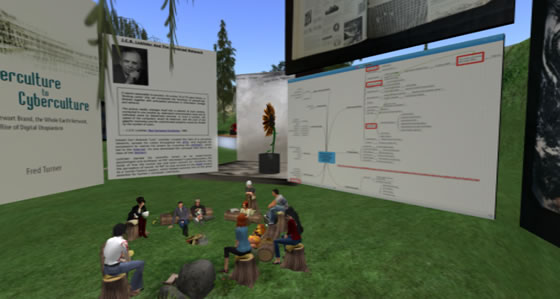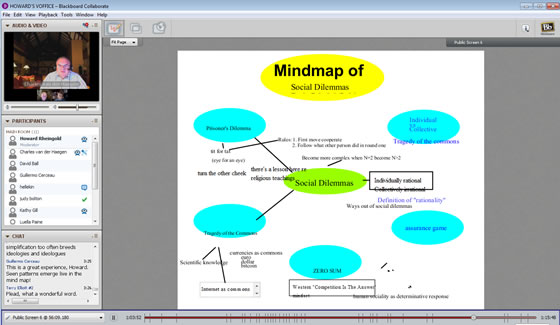Should we give up things in courses because we need time to teach new media? It was a question on Twitter, in the #nmfs_f11 stream of the Digital Awakening course.
I think we don’t need to give up anything at all. It just boils down to doing what you already did, but on public platforms. Taking notes on a blog, bookmarking on a social platform, collaborative mindmapping, reaching out for ideas and help on social networks. As Howard Rheingold would say, new media are mind-amplifiers.
The three online courses I participate in as a student (see previous posts) all use some combination of blogs, social networks, social bookmarks, wiki and chat sessions. I’m getting the feeling (the hope?) this will become “the new normal”.
This picture of the latest session in Second Life of participants in the Digital Awakening course (#nmfs_f11) shows our virtual discussion space, a mindmap and other media, while the participants of course also blog and tweet.
In Toward a Literacy of Communication, (#cooplit) the course facilitated by Howard Rheingold, we use collaborative mindmaps, working on them in real-time using the webconferencing tool Blackboard Collaborate (previously Elluminate). One clever aspect is that one sees in real-time how the map changes, but we cannot see which participant changes what – I have the feeling this helps people to experiment because they don’t have to fear ‘losing face’. It’s a very intense experience: working on a very rapidly changing map, structuring parts of the course as it unfolds and adding additional insights by the participants.
While in Second Life I more felt like sharing a space with the other participants – allowing for more informal meetings before and after the discussion – we did not (yet?) have a very intense group-mindmapping experience in that virtual world.
One of the texts we’re studying in the Digital Awakening course is The Computers as a Communication Device (1968) by J.C.R. Licklider.
His arguments for online communities, computer-assisted meetings and his thoughts about working collaboratively on the same screen are still very relevant today. It’s disappointing that these habits are not yet commonplace in many smaller and medium-sized organizations and companies.
In Toward a Literacy of Cooperation, we talked about game theory (prisoner’s dilemma, assurance game, chicken game…) and the notion of zero-sum game. People have this idea that life is a primarily a competition where one person’s gain is another’s loss. In reality there are plenty of examples of non-zero sum games, where collaboration makes all participants better off.
But non-zero sum does not necessarily mean “we all winâ€. As author Robert Wright explains, it can also mean we all lose. The same technology and learning practices which promise to better mankind, can also be used for destructive planning, especially in conjunction with nuclear, biochemical, biotech or nanotech technology:
Which means that our efforts are also moral issues. The visionary work of people such as Vannevar Bush and J.C.F. Licklider seems to be inspired by the fact that they realized we would have to make sense of a very complex, dangerous and rapidly changing world. Making sense of it, finding solutions and implementing them, needs a kind of augmented or amplified humanity.
Often the disruptive changes we study develop so rapidly that the usual scholarly research publication systems are getting behind. In yet another course, the Massive Open Online Course #Change11, Professor Martin Weller explained how the digital, open and networked world is changing scholarly research (while also provoking tensions in the academic communities).
Historically, we humans had to recognize the humanity of others in the context of a certain class in city-states, then broaden this to bigger entities such as what we call today nations, expanding to whole continental regions and finally arriving at a planetary scale. This recognition of the humanity of humans everywhere will hopefully be expressed and realized through the need for cooperation.
In this context experiencing the real-time collaborative making of a mind map by a bunch of course participants dispersed over the planet (Europe, North America, Australia) was a mind-amplifying experience in itself.
Roland Legrand



